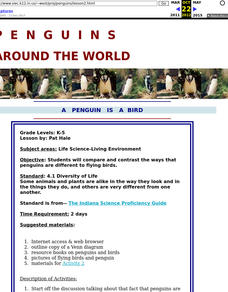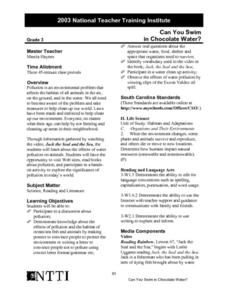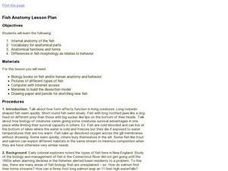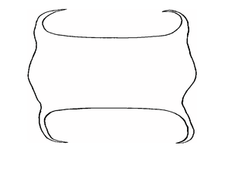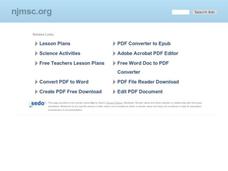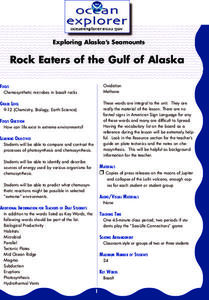Curated OER
Breaking Away (Or Not...)
Students compare and contrast common reproductive strategies used by benthic invertebrates. They describe the most common reproductive strategies among benthic invertebrates on a seamount, and explain why these strategi
Curated OER
A Penguin is a Bird
Students compare and contrast the ways that penguins are different to flying birds.
Curated OER
Can You Swim in Chocolate Water?
Third graders discss water pollution and its affects on animals. They watch a demonstration using a plastic fish in a fish bowl in which various types of water pollution are illustrated.
Curated OER
Your Favorite Wild Animal
In this research skills instructional activity, students select a wild animal and then respond to 5 short answer questions regarding it. In addition, students draw a picture of it and define 6 habitat terms.
Curated OER
Where's My Bot?
Students estimate geographic position based on speed and air travel. In GPS lesson students use GPS to estimate the set and drift of currents.
Curated OER
Conservation and Environmental Protection
Students brainstorm a list of environments and animals from around the world that need protection. They then design and create a slogan about an animal or environment and an environmental protection poster.
Curated OER
Fish Anatomy
Students identify and interpret the internal anatomy of the fish. They also identify and define vocabulary for anatomical parts and anatomical functions and forms. Finally, students identify and interpret the differences in fish...
Curated OER
Going for the Green
Learners use satellite imagery to obtain information on chlorophyll concentration at selected locations in the Earth's oceans.Students explain the relationship between chlorophyll concentration and primary production.Studen
Curated OER
Who's Your Neighbor?
Pupils recognize and identify some of the fauna groups found in deep-sea coral reef communities. They describe common feeding strategies used by benthic animals in deep-sea coral reef communities.Students be able
Curated OER
What is the Earth's Surface Like?
In this Earth's surface worksheet, students complete a graphic organizer by writing in 1 main idea and 4 supporting details describing the Earth's surface.
Curated OER
Skates
Students gain understanding of structure, characteristics, and basic needs of living things and their role in world, identify parts of skate, observe details of skate's body and skate egg case, and identify unique characteristics of skates.
Curated OER
Mapping Seamounts in the Gulf of Alaska
Learners describe major topographic features on the Patton Seamount, and interpret two-dimensional topographic data. They create three-dimensional models of landforms from two-dimensional topographic data.
Curated OER
Amphipods
Students identify organisms that live at the bottom of the body of water. In this biology lesson, students evaluate the effects of pollution to amphipods population. They examine collected data and create a bar graph comparing them.
Curated OER
Head to Foot
Students describe the body form and major anatomical structures of squids and describe some unusual or unique features of newly-discovered deep water squid species. They infer what types of food squids use from their anatomical features.
Curated OER
Leaving Home
Students explain the importance of larval dispersal and retention to populations. They collect data on organisms and examine it.
Curated OER
Astronauts Train in Deep-Space Brine
Students examine an article on astronauts training in deep space brine then discuss what they learned. In this investigative lesson students get into groups and design an exercise that includes isolation, silence and conflict resolution.
Curated OER
Rock Eaters of the Gulf of Alaska
Learners compare and contrast the processes of photosynthesis and chemosynthesis. They identify and describe sources of energy used by various organisms for chemosynthesis.
Curated OER
Mountains in the Sea Exploration No Escape
High schoolers study data to hypothesis about the influence of a water circulation cell on the retention of benthic invertebrate larvae in the area of a seamount. They investigate the positives and negatives of larvae retention in this...
Curated OER
Natural Inquirer
Students interview wildlife experts to gain information needed to research and write a report about an aquatic plant or animal affected by climate change.
Curated OER
Water Quality Monitoring
Students comprehend the four parameters of water quality. They perform tests for salinity, dissolved oxygen, pH and clarity or turbidity. Students comprehend why scientists and environmental managers monitor water uality and aquatic...
Curated OER
Survival of the Fittest
Sixth graders create their own "never before seen" marine creatures and examine how not all creatures in the sea swim, not all have sharp teeth
Curated OER
The Water Cycle
When homeschooling parents and children tackle the water cycle, the results can be a fascinating exploration of our environment.



